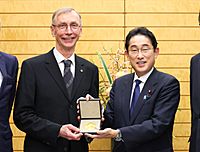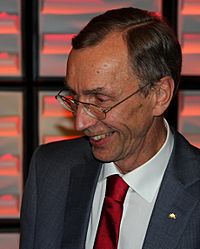Svante Pääbo facts for kids
Quick facts for kids
Svante Pääbo
ForMemRS KmstkNO
|
|
|---|---|

Pääbo in 2016
|
|
| Born | 20 April 1955 Stockholm, Sweden
|
| Education | Uppsala University (PhD) |
| Known for | Paleogenetics |
| Spouse(s) |
Linda Vigilant
(m. 2008) |
| Children | 2 |
| Relatives | Sune Bergström (father) |
| Awards |
|
| Scientific career | |
| Fields |
|
| Institutions |
|
| Thesis | How the E19 Protein of Adenoviruses Modulates the Immune System (1986) |
Svante Pääbo is a Swedish geneticist and a Nobel Prize winner. He is famous for his work in evolutionary genetics, which studies how living things change over time. He is one of the people who started a field called paleogenetics. This field uses genetics to learn about ancient humans and other old species.
Pääbo has done a lot of research on the Neanderthal genome. A genome is like a complete instruction book for building a living thing. In 1997, he became the first director of the Department of Genetics at the Max Planck Institute for Evolutionary Anthropology in Leipzig, Germany. He also teaches at Leipzig University and the Okinawa Institute of Science and Technology in Japan.
In 2022, he received the Nobel Prize in Physiology or Medicine. He won this award for his amazing discoveries about the DNA of ancient human relatives and how humans evolved.
Contents
Early Life and Education
Svante Pääbo was born in Stockholm, Sweden, in 1955. He grew up there with his mother, Karin Pääbo, who was a chemist from Estonia. His father was Sune Bergström, a Swedish biochemist who also won a Nobel Prize in 1982.
Pääbo speaks Swedish as his first language. He has said he feels a special connection to Estonia.
In 1975, Pääbo began studying at Uppsala University. He earned his PhD from Uppsala University in 1986. His research looked at how a certain protein from adenoviruses affects the body's immune system.
Discoveries in Paleogenetics
Pääbo is known as one of the founders of paleogenetics. This science uses genetics to study early humans and other ancient living things.
From 1986 to 1990, he worked as a researcher in Switzerland and the United States. He studied the DNA of extinct mammals. In 1990, he became a professor at the University of Munich. Then, in 1997, he helped start the Max Planck Institute for Evolutionary Anthropology in Leipzig, Germany.
Uncovering Neanderthal DNA
In 1997, Pääbo and his team successfully sequenced Neanderthal mitochondrial DNA (mtDNA). This is a special type of DNA found in the "power plants" of cells. They got this DNA from a bone found in the Neander valley. This was a big step in understanding our ancient relatives.
In 2006, Pääbo announced a plan to map the entire Neanderthal genome. This meant trying to read all the genetic instructions of a Neanderthal. In 2009, his team completed the first draft of the Neanderthal genome. They sequenced over 3 billion base pairs, which are the building blocks of DNA.
The Denisovans and Human Evolution
In 2010, Pääbo and his team published an important report. They analyzed DNA from a finger bone found in the Denisova Cave in Siberia. The results showed that the bone belonged to a new group of ancient humans. This group had not been known before and was named the Denisova hominins.
In May 2010, Pääbo and his colleagues published the draft sequence of the Neanderthal genome in the journal Science. They also found that Neanderthals and early modern humans likely had children together. This mixing of genes happened about 50,000 to 60,000 years ago in the Middle East. This idea of interbreeding between archaic and modern humans is widely accepted by scientists today.
Pääbo's work also showed that a gene called TKTL1 is slightly different in Neanderthals compared to modern humans. This difference might have affected how their brains developed.
Research on Genes and Health
In 2002, Pääbo's team published findings about the "language gene," called FOXP2. This gene is linked to how people develop language skills.
More recently, in 2020, Pääbo and Hugo Zeberg found something interesting about COVID-19. They discovered that certain genetic differences can make people more likely to get very sick from the virus. These genetic differences are linked to Neanderthal heritage in Europeans. This means some genes from our ancient relatives might still affect our health today.
Awards and Recognition

Svante Pääbo has received many important awards for his scientific work.
- In 1992, he won the Gottfried Wilhelm Leibniz Prize. This is a very high honor for research in Germany.
- He became a member of the Royal Swedish Academy of Sciences in 2000.
- In 2005, he received the Louis-Jeantet Prize for Medicine.
- In 2009, he was awarded the Kistler Prize for his work on ancient DNA. He started this work in 1984 by studying a 2,400-year-old mummy.
- In 2013, he received the Gruber Prize in Genetics for his amazing research in evolutionary genetics.
- He was elected a Foreign Member of the Royal Society in 2016.
- In 2018, he received the Princess of Asturias Awards for Scientific Research.
- He won the Japan Prize in 2020 and the Massry Prize in 2021.
- His biggest award came in 2022 when he won the Nobel Prize in Physiology or Medicine. He received it for his groundbreaking work in sequencing the first Neanderthal genome.
- In 2024, he was honored with the Commander Grand Cross of the Order of the Polar Star in Sweden.
See also
 In Spanish: Svante Pääbo para niños
In Spanish: Svante Pääbo para niños
- List of Nobel laureates in Physiology or Medicine
- List of Swedish Nobel laureates
 | Precious Adams |
 | Lauren Anderson |
 | Janet Collins |


